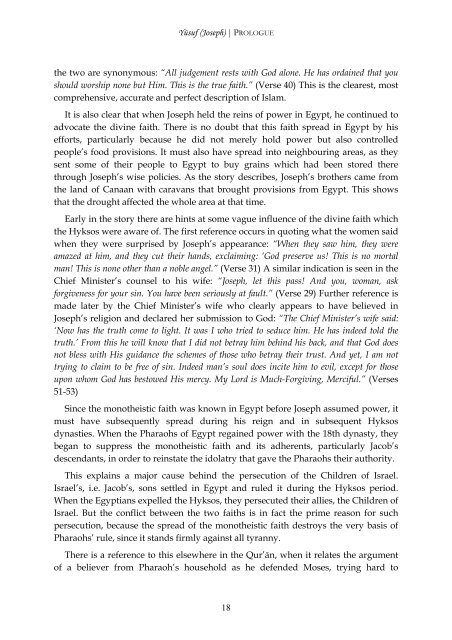Volume 10 Surah 12 - 15 - Enjoy Islam
Volume 10 Surah 12 - 15 - Enjoy Islam
Volume 10 Surah 12 - 15 - Enjoy Islam
You also want an ePaper? Increase the reach of your titles
YUMPU automatically turns print PDFs into web optimized ePapers that Google loves.
Yūsuf (Joseph) | PROLOGUE<br />
the two are synonymous: “All judgement rests with God alone. He has ordained that you<br />
should worship none but Him. This is the true faith.” (Verse 40) This is the clearest, most<br />
comprehensive, accurate and perfect description of <strong>Islam</strong>.<br />
It is also clear that when Joseph held the reins of power in Egypt, he continued to<br />
advocate the divine faith. There is no doubt that this faith spread in Egypt by his<br />
efforts, particularly because he did not merely hold power but also controlled<br />
people’s food provisions. It must also have spread into neighbouring areas, as they<br />
sent some of their people to Egypt to buy grains which had been stored there<br />
through Joseph’s wise policies. As the story describes, Joseph’s brothers came from<br />
the land of Canaan with caravans that brought provisions from Egypt. This shows<br />
that the drought affected the whole area at that time.<br />
Early in the story there are hints at some vague influence of the divine faith which<br />
the Hyksos were aware of. The first reference occurs in quoting what the women said<br />
when they were surprised by Joseph’s appearance: “When they saw him, they were<br />
amazed at him, and they cut their hands, exclaiming: ‘God preserve us! This is no mortal<br />
man! This is none other than a noble angel.” (Verse 31) A similar indication is seen in the<br />
Chief Minister’s counsel to his wife: “Joseph, let this pass! And you, woman, ask<br />
forgiveness for your sin. You have been seriously at fault.” (Verse 29) Further reference is<br />
made later by the Chief Minister’s wife who clearly appears to have believed in<br />
Joseph’s religion and declared her submission to God: “The Chief Minister’s wife said:<br />
‘Now has the truth come to light. It was I who tried to seduce him. He has indeed told the<br />
truth.’ From this he will know that I did not betray him behind his back, and that God does<br />
not bless with His guidance the schemes of those who betray their trust. And yet, I am not<br />
trying to claim to be free of sin. Indeed man’s soul does incite him to evil, except for those<br />
upon whom God has bestowed His mercy. My Lord is Much-Forgiving, Merciful.” (Verses<br />
51-53)<br />
Since the monotheistic faith was known in Egypt before Joseph assumed power, it<br />
must have subsequently spread during his reign and in subsequent Hyksos<br />
dynasties. When the Pharaohs of Egypt regained power with the 18th dynasty, they<br />
began to suppress the monotheistic faith and its adherents, particularly Jacob’s<br />
descendants, in order to reinstate the idolatry that gave the Pharaohs their authority.<br />
This explains a major cause behind the persecution of the Children of Israel.<br />
Israel’s, i.e. Jacob’s, sons settled in Egypt and ruled it during the Hyksos period.<br />
When the Egyptians expelled the Hyksos, they persecuted their allies, the Children of<br />
Israel. But the conflict between the two faiths is in fact the prime reason for such<br />
persecution, because the spread of the monotheistic faith destroys the very basis of<br />
Pharaohs’ rule, since it stands firmly against all tyranny.<br />
There is a reference to this elsewhere in the Qur’ān, when it relates the argument<br />
of a believer from Pharaoh’s household as he defended Moses, trying hard to<br />
18

















